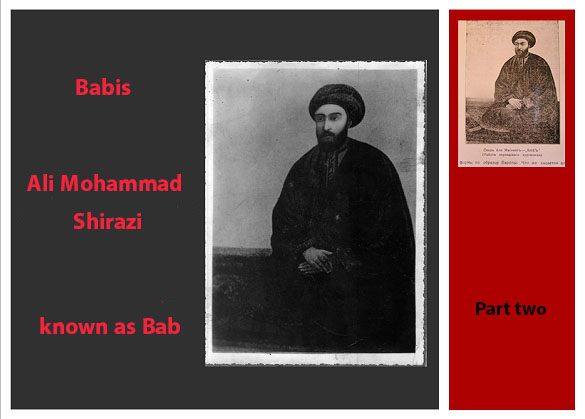
The founder of Bab; Mirza Ali Mohammad Shirazi
1235-1266 AH
Bab’s claim from the viewpoint of Abdul-Baha
On pages 3 and 4 of the book “Personal Article of a Tourist” on Bab’s claim, he writes, “He began to speak and comment on the status of the Bab, and by the word Babism, he meant that I am the mediator of the bounties of a great person who is still behind the veil of honor and possesses infinite perfection, and I am moving at his will and clinging to the rope of his guardianship.
And in the first book that he has written on the commentary of Surah Yusuf, in all positions, he has addressed the absent person who benefited from him and sought help in preparing his principles and wished for the sacrifice of his life for the sake of his love, including this phrase:
” O Baqiyyatullah (Remainder of God), I have ransomed everything to you and accepted insults in your path, and I only wished to be killed for your love…”
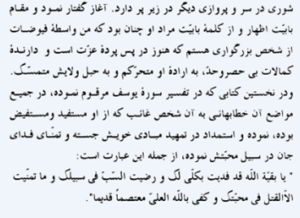
Who is Baqiyyatullah?
As you know, one of the titles of the twelfth Imam of the Shiites, Hazrat Sahib al-Zaman (may God hasten his reappearance) is “Baqiyatullah” which has been used in many works about that Imam and its use in the same sense in the early works of the chapter is acknowledged by Fazel Mazandarani on page 68 of Asrar al-Athar, Volume 2.
The Baha’is have falsely attributed this title to Bahaullah in order to escape the predicament of the Bab’s confession.
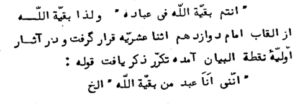
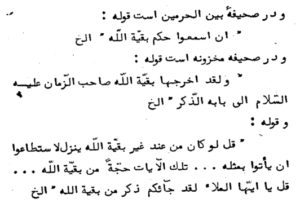
Letters of Living
After Mullah Hussein, seventeen other disciples and pupils of Seyed Rashti, who were acquaintances and companions of Bashrawi, united with him and accepted the Babism of Mirza Ali Mohammad, who called them the Letters of Living, which are equal to the number 18. The last person out of the Hayy letters is Mohammad Ali Barforoshi known as Qudus. Qarah al-Ain is also considered among the Letters of Living, although he has never seen Bab.
The story of Hajj pilgrimage and the announcement of the claim
The Babi and Baha’i historians claim that Mirza Ali Mohammad decided to pay a pilgrimage to the Ka’bah or the House of God in the same year, where he expressed his claim based on the good news of the Promised Ruler of Islam and even communicated it in a letter to noble man of Mecca.
Before Bab, two other people claimed Mahdism in Mecca and were killed immediately. One was Abdullah al-Ajami in 1081Ah and the other is Mahdi al-Bengali in 1203 AH. The other case is the same that happened in Mecca in 1358 AH, which also led to the killing of the claimant and his allies. (Qahtani)
Suspicion of the claim in Hajj pilgrimage
The history of Muslims has not written such a journey for him.
Nowhere has he been called Haj Ali Mohammad.
Basically, the proclamation of the claim of Mahdism in that glorious and majestic gathering will never be held without hue and cry.
Examining Bob’s claims is the opposite of this claim.
A careful study of Nabil Zarandi’s history definitely clarifies the falsity of this claim.
The reason for suspicion in the Hajj journey
1-On page 112, it is stated that Mullah Hussein Bashrawi sent a letter to Bab on the night of the twenty-seventh of Ramadan in 1260.
2- On page 115, it is stated that after receiving Mullah Hussein’s letter, Bob left for Hajj pilgrimage.
3- On page 128, it is written that Bab’s journey to Mecca until his return to Bushehr lasted nine lunar months.
4-Then he narrates the stories related to Shiraz that happened after Bab’s return from Hajj and we will talk about it in the future and writes on page 142: Bab’s family used to stay at home with their blessed family until the first Eid Nowruz came after the announcement of His Holiness. Nowruz day corresponded to the tenth day of Rabi ‘al-Awal in 1261 AH.
5- If we calculate the beginning of the pilgrimage from the beginning of the month of Shawwal in the year 1260 AH and add nine months to it, we will reach the end of the month of Jamadi al-Thani in the year 1261 AH. The fabrication of the story of Bab’s trip to Mecca becomes clear from the fact that from the first of Shawwal in 1260 AH to the tenth of Rabi ‘al-Awal in 1261AH, it takes exactly five months and ten days, while Bab’s trip to Mecca had lasted nine months!
Examining Bab’s claim at the outset of mission (Amr)
On page 82 of the Persian Motale’al Anvar, he writes that when Bab decided to travel to Hajj, he ordered the first believers to disperse to various places and without mentioning his name and symbol say everywhere that the promised “Bab” had appeared with Burhan-e Matin or a solid argument.
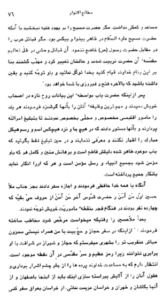
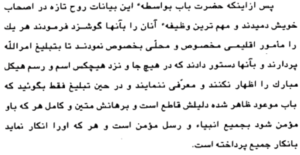
Claiming to be Rokn-e Rabe’ or a fourth pillar
And on page 120 of the Persian book of Motale’al Anvar, it is mentioned that when Bab met Mirza Mohit Kermani Sheikhi, who was considered his rival, in Masjid al-Haram or Ka’aba, he introduced himself to him as Bab the Ma’rifatullah, that is, the same Qarieh Zahereh or Roken-e Rabe’ or the fourth pillar.
Examining Beina al-Harmain Treatise
If we look at the Treatise of Beina al-Harmain, which is said to have been written between Mecca and Medina and in response to the problems of Mirza Mohit, we see that all over it, he believes in himself no position other than the servitude of Hazrat Hojjat Hayy and Imam of the Age (may God hasten his reappearance).
Mohazerat or Lectures is a book composed of the speeches of Eshraq Khavari, the famous Baha’i preacher and author, at a weekly Baha’i meeting, and has been reproduced in two volumes with serial page numbers by the Amri Publishing Committee. Parts of this treatise are found on pages 670 and 730.
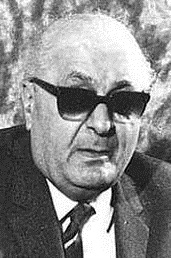
The source of Beina al-Harmain Treatise
You can find the sources of the treatise on pages 14 and 15 of the Book “The Bab’s Religion authored by Ali Mohammad Farhoush Babi (A-F).
Returning from Hajj pilgrimage and announcement of Babism
Mirza Ali Mohammad returned to Bushehr from Hejaz in 1261 AH and from there he wrote to one of his disciples named Mullah Sadegh Khorasani (this instruction was given to him within the Treatise of the characteristics Khasa’el-e Sab’ah, Summary of the History of Nabil, page 130) that he should add the sentence: I bear witness that Ali is before Nabil (Nabil has the same number as Muhammad in the alphabetical Abjad order, so it is customary to write Nabil in names instead of Mohammad. The previous word has also been added to extend and obscure the name.) At the same time, this phrase clarifies Bab’s claim well. The Bab of Baqiyatullah or Remnant of God means: I bear witness that Ali Mohammad is the Bab of the Imam of the Age (may God hasten his reappearance).
Commotion in Shiraz and the summoning of Bab
Because Mulla Sadegh did so, and this act, which was considered as a kind of heresy and propaganda slogan, caused a commotion in Shiraz and the people demanded that the cause of the incident be punished.
The ruler of Shiraz, Nizama al-Dawlah Hussein Khan Ajudan Bashi, arrested Mullah Sadegh, and because he blamed Bab and presented his works such as Surah Al-Mulk, Nizamat al-Dawlah summoned Mirza Ali Mohammad from Bushehr.
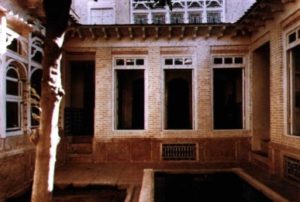
Interrogation and trial session
Nabil Zarandi describes the process on pages 137 to 141 of his own history in such a way that the first one was brought to Shiraz with full respect and he was interrogated in a meeting with the presence of the Friday prayer leader and the ruler of Shiraz.
At the beginning of the session, there was a heated conversation between Nizam al-Dawla and Bab, and a misunderstanding ensued, in which Nizam al-Dawla ordered that he was received with a knockout slap in the face. But the Friday Imam mediated and after caressing Mirza Ali Mohammad, asked about his claim.
Taking back claim of Babi’sm
The Imam said: I am neither the lawyer of the promised Gha’em nor a mediator between the absent Imam and the people. The Friday prayer leader said enough is enough.” And it was decided that Bab would repeat this confession in the Vakil Mosque in Shiraz to quell the public excitement.
Mirza Ali Mohammad went up the pulpit on Friday and cursed himself and his followers with these words and retracted his previous speech: God’s curse on the one who considers me as the lawyer of the absent Imam, God’s curse on the one who considers me, the Bab as Imam…God’s curse on the one who denies the Imamate of the Commander of the Faithful, Imam Ali and other pure Imams.
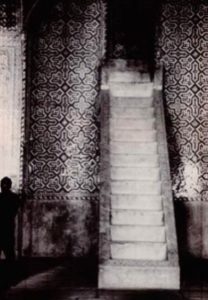
The claim of Abul-Baha
In the hope of concealing this wretchedness and unsteadiness, Abbas Effendi writes on page 7 of the Personal Article of a Tourist:
“He spoke on the pulpit in a way that caused the silence and stillness of those present and the steadfastness and penetration of the followers and It was thought that he was claiming the mediation of grace from Hazrat Sahib al-Zaman (as). Later, it became clear that he meant by Babism is another city and the mediation of blessings from another person…”
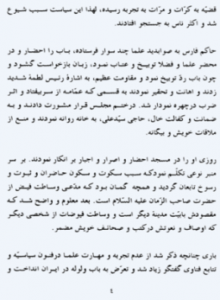
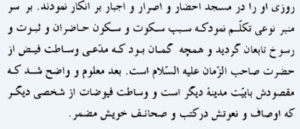
The answer to blather
The words of Bab only indicate that he has returned from his previous claim and never mentions the Babism of another Medina, especially since Bab in his previous works and in his later writings until the end of 1264 AH warned that he is the vicegerent and the Bab of Hazrat Hojj ibn Al-Hassan Al-Askari.
Hidden propaganda
After returning from the Vakil Mosque, Mirza Ali Mohammad was monitored by the order of the ruler of Fars and was forbidden from public meetings, but he was in secret contact with the disciples and secretly preached. (The first volume of Al-Kawakba al-Dorya, pp. 52 & 53)
The belief of Seyed Yahya Darabi
According to the Babis and the Baha’is, during this time, the son of one of the Sheikhi ulema who is the same Seyed Ja’far Kashfi, the owner of Sanabargh, named Seyyihi Darabi, became acquainted with Mirza Ali Mohammad, and when Bab wrote a commentary on Surah al-Kawthar at his request, Seyed Yahya converted to him. A review of the recent book also yields nothing but the previous conclusion; because it is from head to toe in proving the Imamate, life, absence, and longevity of Hazrat Sahib al-Zaman (may God hasten his reappearance) and the non-appointed representation and chapter of the chapter. A review of the recent book also yields nothing but the previous conclusion, it can only be found linearly, some of which we will cite; because it totally proved the Imamate, life, absence, and longevity of Hazrat Sahib al-Zaman (may God hasten his reappearance) and the vicegerency and the undocumented Babism of the Bab.
Escaping from Shiraz and going to Isfahan
It was in the middle of 1262 AH that an epidemic, most likely cholera, was found in Shiraz, and this deadly disease shattered the affairs of Shiraz. On the second of this year, he escaped from Shiraz to Isfahan with the help of frightened and elusive disciples, and due to the migration of wealthy people, there was a great turmoil and at this time Mirza Ali Mohammad also fled from Shiraz to Isfahan in the second half of this year with the help of frightened and fleeing disciples. (p. 104, Volume 1, Al-Kawakba al-Dorya quoted from the letter of Bab to Haj Mirza Aghasi)
Letter to the ruler of Isfahan
On the way, he wrote a letter to the ruler of Isfahan to prepare a house for him. At that time, Manouchehr Khan Mo’tamed al-Dowleh ruled Isfahan. He was originally from the Russian Georgia as well as an influential member of the Qajar court.
Having seeing Bab’s letter, Manouchehr Khan ordered Sultan Al-Ulama, the Friday prayer leader of the city, to prepare his house for Bab to live and receive, and he sent his brother outside the gate to welcome him. (p. 190, Summary of History of Nabil)
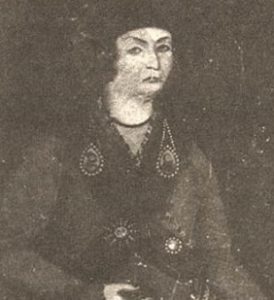
Ruler of Isfahan
The mysterious reason for respecting Bob
The reason for this excessive respect is not known. Have they been friends before? Or had an order from a high-ranking official about Bab reached the ruler? According to Shoghi Effendi, on page 110 of the first volume of “God Passes By”, Mo’tamed was a non-Muslim and an Armenian confidant and had no record with Bab.
Introducing “God Passes By”
“God Passes By” is in English originally. The book’s author, Shoghi Effendi, the granddaughter of Abdul-Bah and his successor The book was translated into Persian by Nasrullah Mavedat and was published in four volumes with the approval of the National Assembly of Iran by the relevant committee. So far, the second volume has been republished for three times and the other volumes only once.
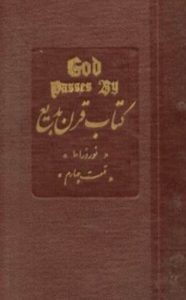
The belief of Manouchehr Khan
It is said that Bab entered the house of the Friday Imam and one night, at his request, wrote an exegesis on Surah Wal-Asr, in which his claim is also Babism, which was liked by the host, and when this news reached Mo’tamed, he was eager to see him and came to see him. There were some ulema in the meeting and Manouchehr Khan asked them to prove to him the prophethood of the Holy Prophet (blessings of God upon him and his progeny) and when they did not answer, Mirza Ali Mohammad wrote a special treatise on this subject called Prophethood. After writing it, Mo’tamed al-Dawlah, under the influence of Islam, converted to Islam (“God Passes By”, p. 110, volume one”) and loudly confessed that he had not had a heartfelt faith in Islam until then (p. 193, Summary of History)
Mysterious support
Following this event, Manouchehr Khan made his support for Bab more obvious, and the Babis freely propagated their ideas, until the people of Isfahan became angry and, despairing of the governor’s care, complained to the Shah, and Mohammad Shah ordered Mirza Ali Mohammad should be sent to Tehran. In order to deceive the people, Moa’tamed sent Bab with a group on horseback to the capital and secretly arranged for him to be returned to his covered mansion somehow cleverly at night. (Persian Motale’al Anvar, P. 200)
Study the continuation of the article in part three …
part three…
part four…
part five…





